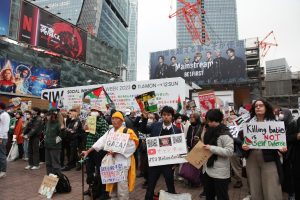Megumi, a 35-year-old marketer and a new mother, had just put her daughter to sleep when she was confronted with harrowing images and videos of civilians being bombed in the Gaza Strip on X.
“I was so shocked – I still vividly remember the video of a father carrying the bodies of his murdered child in plastic bags,” Megumi recalled. “I couldn’t help but see those murdered children as my own, and I began searching for ways to help stop the slaughter.”
That was in late October. Since then, Megumi has taken part in rallies, spread online petitions, sent emails to the Japanese government, and developed Olive Journal, an online platform deconstructing the Israeli-Palestine war and offering resources for pro-Palestine individuals.
“Many people in Japan still perceive the issue as ‘complicated,’” she said. “I wanted to show that even from Japan, far away from Gaza, anyone can act to stand with Palestine.”
Megumi’s story is just one piece of a growing, nonviolent movement of youth who have advanced the pro-Palestine cause in Tokyo. Not centralized under the leadership of a single organization or individual, Japan’s informal pro-Palestine movement encompasses a diversity of efforts – from resistance music events and art galleries to protests outside the Ministry of Foreign Affairs – largely organized by young people across the country.
At the University of Tokyo’s Komaba campus, a Palestine Solidarity Encampment was established in late April “to oppose the genocide by the Israeli government.” Three months on, the camp remains active and has successfully raised 675,023 Japanese yen (around $4,400) to provide direct support to civilians in Gaza. As part of a larger initiative by college students known as Tokyo Universities for Palestine Action (TUPAc), pro-Palestine demonstrations and fundraisers have been steadily increasing since they began in mid-October across Tokyo’s college campuses.
“Since my Pakistani friend started posting tragic pictures on Instagram after October 7th, I started to get interested in this topic,” said Hiyori Hatta, a student activist at Ritsumeikan Asia Pacific University. “I’ve always struggled with the fact most people are ignoring this topic – but I’ve also found that more Japanese people have gotten interested in the war recently,” Hatta said.
Some 9,000 kilometers separate the Gaza Strip from Japan. Why has a pro-Palestine movement gained significant traction in the nation’s capital?
Beyond witnessing widespread coverage of the war on social media and cable news, many Japanese youths share a deeper motivation for advocating peace in Palestine: an intense belief in their own country’s complicity in the war.
Outlined in Japan’s post-war constitution, three principles governing the transfer of defense equipment and technology traditionally prohibit the export of weapons to conflict zones. However, in 2014, the government revised these guidelines to permit the transfer of weapons to countries considered security partners, such as the United States.
“Palestine or Israel would actually be considered one of those areas that [the Japanese government] technically, at least according to the law, are not allowed to export weapons to,” Nozomi Nakaganeku Saito, a lecturer at Amherst College, said.
“But because they’re supplying the U.S. military and the United States is not specifically at war with Palestinians, Japan is able to send the weapons to the United States, and then the United States sends those weapons to Israel.”
Japanese youths argue that Japan is not only a supplier but also a buyer of Israeli weapons.
Earlier in March, while countries worldwide reconsidered their military relationships with Israel and halted arms exports and purchases, the Japanese Ministry of Defense proposed purchasing attack drones from leading Israeli defense companies, including Elbit Systems and Israel Aerospace Industries (IAI). In response, protesters convened an “emergency protest” outside Nippon Aircraft Supply Headquarters.
“[Youth] see it as a global problem of colonialism, racism, capitalism, and social contradictions imposed on vulnerable people, all connected to issues that Japan itself holds,” Megumi said. “I believe it is very important that youths have a holistic perspective on the Palestinian issue, recognizing it as not just a ‘conflict in the Middle East’ but as a matter connected to issues that concern us all.”
Anger and frustration over Japan’s arms trade, along with its cordial relationship with Israel, have driven youths to protest outside the U.S. Embassy in Tokyo, the Prime Minister’s Office, the Ministry of Foreign Affairs, and other significant locations. A protest flyer opposing the July 28 meeting between U.S. Secretary of State Antony Blinken and Foreign Minister Kamikawa Yoko featured a poster with a bloody handprint superimposed over Blinken’s face, alongside the words, “BLINKEN, YOU ARE NOT WELCOME HERE.”
“We want to get more people involved with this topic and raise our voices to our governments,” said Hatta. “As a Japanese person, I thought that I could do something by using my connections to the Japanese community.”
Despite youths in Tokyo leading Japan’s pro-Palestine movement for over half a year, Megumi attributes a lack of progress to Japan’s “conservative” society. “The youth also comprise a relatively low percentage of the population in Japan, and many may feel that their opinions are not respected in politics and society,” she said. “In such a situation, it requires courage and energy to speak up.”
For the past 191 days, young activists and students have engaged daily in protests, art exhibitions, flea markets, and petitions in support of Palestine. Although they emphasize that their movement is not limited to youths, young faces predominantly, if not exclusively, make up the crowd of peaceful protestors flying Palestinian flags and donning black and white keffiyehs amid the sweltering Tokyo heat. Their determination to continue shows little signs of waning.

































